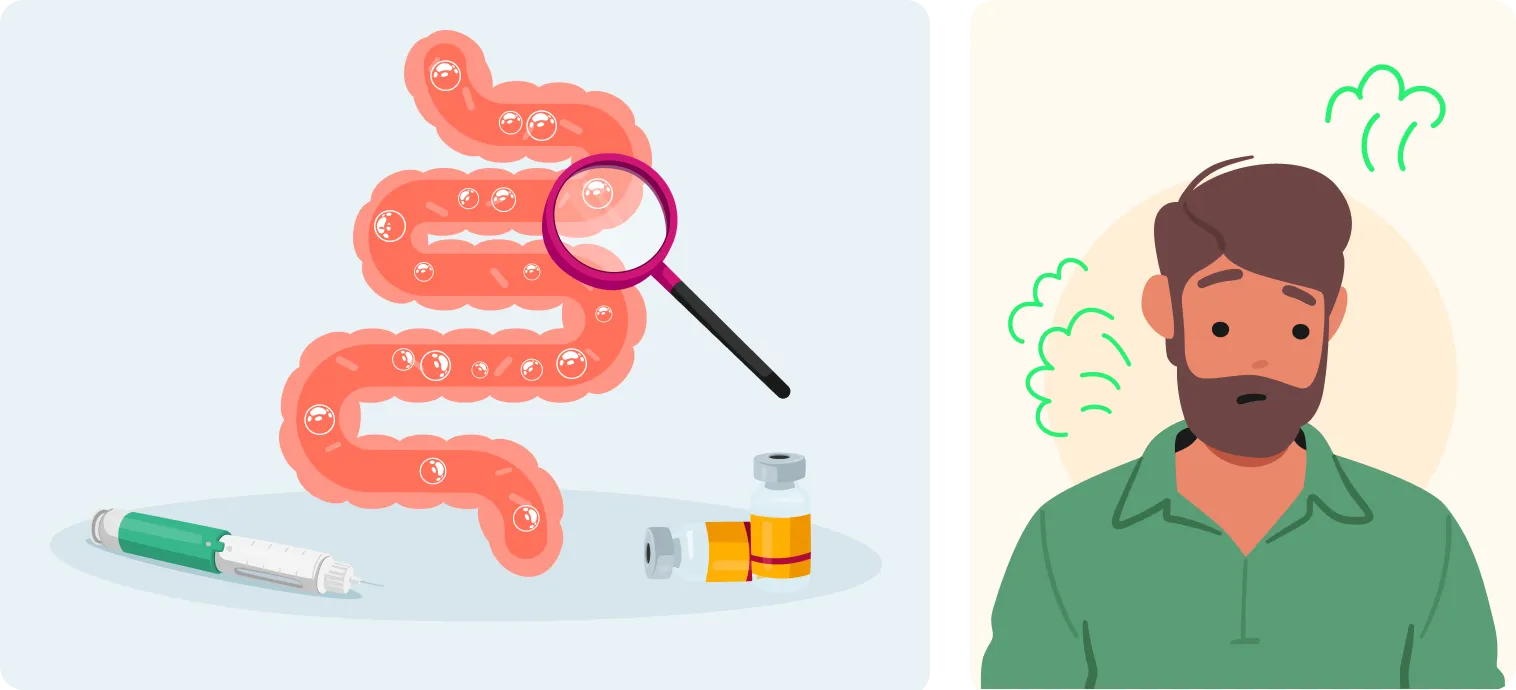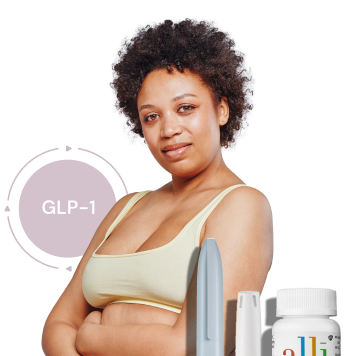Experiencing excess gas, passing wind, farting, or increased flatulence from GLP-1 injections? Whatever you call it, we understand that it may feel awkward to discuss this weight loss side effect. Whilst flatulence isn’t always prominently listed in official prescribing information, it has been frequently reported by people using semaglutide (Wegovy) or tirzepatide (Mounjaro)—particularly during the initial weeks of treatment.
The good news is that for most people, these digestive changes are temporary and entirely manageable with the right approach.
Read through this fact sheet on Flatulence from GLP-1 Injections to better understand why it happens, when it typically occurs, and what you can do about it.

What Is Flatulence and Why Does It Happen on GLP-1s?
Flatulence—also known as passing wind—is a natural part of digestion. It happens when gas builds up in your intestines and is released through the rectum. We all pass gas, but GLP-1 weight loss treatmens can make it more noticeable for a few key reasons:
- Slower digestion: These medications work by delaying gastric emptying, meaning food stays in your stomach and intestines longer. This gives bacteria more time to break down food and release gas.
- Changes in eating habits: You may find yourself eating smaller meals, different foods, or higher-protein options—some of which are naturally gas-producing.
- Reduced movement in the gut: GLP-1s can slow down the muscles that move food through your digestive system, contributing to bloating and trapped gas.
Some people also experience constipation or diarrhoea at the same time, which can further disrupt normal digestion and increase gas.
What Flatulence Feels Like on GLP-1s
While everyone’s experience is different, common complaints include:
- More frequent wind than usual
- Feeling bloated or full after small meals
- Gurgling or movement sounds in the abdomen
- Gas that’s difficult to pass or accompanied by cramps
- Embarrassment or discomfort in social situations
- Sulphur burps
How to Reduce Flatulence While on GLP-1 Medication
If excess gas is making you uncomfortable, there are a few simple strategies that can help:
1. Eat slowly and mindfully
Rushing meals can cause you to swallow more air, which adds to gas build-up. Chew thoroughly and avoid talking while eating.
2. Avoid carbonated drinks
Fizzy water, soft drinks, and even kombucha can increase trapped gas.
3. Limit common gas-producing foods
Try cutting back (temporarily) on:
- Beans and lentils
- Broccoli, cabbage, and onions
- Artificial sweeteners like sorbitol or xylitol
- High-fibre foods, if added too quickly to your diet
4. Stay hydrated
Drinking enough water supports regular digestion and helps move gas through the intestines.
5. Light movement helps
A short walk after meals can relieve bloating and encourage digestion.
6. Try a food and symptom diary
Track which foods trigger more gas so you can make gentle adjustments.
When to Speak to a Healthcare Professional
Flatulence is usually harmless, but you should reach out to your pharmacist or GP if:
- Gas is severe, painful, or affecting your daily life
- You also have persistent diarrhoea or constipation
- You’ve had recent unexplained weight loss
- You feel pressure, cramping, or bloating that doesn’t improve
They can check for other causes and recommend appropriate support, whether that’s adjusting your dose, checking for intolerances, or suggesting over-the-counter remedies.
FAQs
Is flatulence a known side effect of GLP-1 medications?
While not always listed officially, many people report increased gas, especially during the first few weeks. It’s likely due to changes in digestion, gut motility, and diet.
Will the flatulence go away on its own?
In most cases, yes. As your body adapts to the medication, symptoms like gas and bloating often improve within a few weeks.
What foods should I avoid if I’m getting gassy on GLP-1s?
Start by reducing beans, lentils, onions, cabbage, fizzy drinks, and sweeteners like sorbitol. Everyone is different, so keep track of what affects you most.
Is it okay to take anti-gas medication while on GLP-1s?
Yes. Speak with your pharmacist. Products like simethicone or activated charcoal may provide short-term relief, especially during the adjustment phase.
Can I still lose weight if I’m bloated or gassy?
Absolutely. Flatulence doesn’t affect weight loss itself. It’s just a temporary digestive response. Continue to focus on your overall goals and listen to your body.
Related
- Acid Reflux & Heartburn
- Bloating from GLP-1 Injections
- Constipation from GLP-1 Injections
- Common GLP-1 Weight-loss Side Effects
- Diarrhoea from GLP-1 Injections
- Indigestion from GLP-1 Injections
- Injectable Weight Loss Treatments (GLP-1)
- Nausea & Vomiting from GLP-1 Injections
- Sulphur Burps from GLP-1 Injections (Mounjaro, Wegovy): How to Manage Them


























